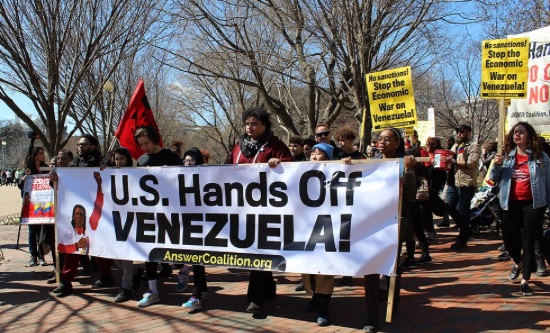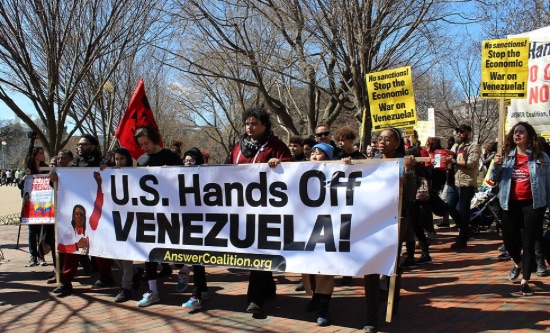
The imperialist sanctions imposed on Russia following its invasion of Ukraine have had a sharp impact on global oil supplies, leaving major states casting around for new sources of the precious commodity. It is this desperation that drove US officials to travel to Caracas in March to negotiate with President Nicolas Maduro, leading to the announcement by the US government on 17 May that it will lift some sanctions on Venezuela, authorising US and European oil companies to ‘negotiate and restart operations’. Whilst the US has used the opportunity to wring concessions out of Venezuela’s socialist government, forcing it back into negotiations with a discredited opposition, the relaxation of the oil embargo will bring significant benefits to a Venezuelan economy already beginning to emerge from the worst effects of years of US sanctions. SAM McGILL reports.
The oil embargo
The oil giant Chevron had been lobbying US President Biden for months to allow it to trade Venezuelan oil and restart production in four major joint ventures which once produced 200,000 barrels per day (bpd). Prior to an oil embargo imposed by Donald Trump in 2017, Venezuela exported 500,000 bpd to the US. The embargo – illegal under international law – slashed total output from 3 million bpd in 2012 to historic lows of 500,000 bpd in 2020. A complicated web of sanctions also impedes imports of diluent and spare parts, and has cut off Venezuela’s PDVSA oil company from lines of international credit and finance. Secondary sanctions target foreign companies, blocking oil tankers scheduled to transport Venezuelan crude. This economic war has devastated living standards as Venezuela’s GDP contracted by 74.3% between 2012 and 2020. Venezuelan Vice President Delcy Rodriguez estimated that due to secondary sanctions, ‘one of every four dollars must be allocated to cover payments for the mobilisation and marketing of our oil’. Any easing of restrictions on the oil sector will have a major positive economic impact, allowing the United Socialist Party (PSUV) government to increase investments in flagship social programmes hard-hit by the economic crisis. The announcement is testament to the resistance of the Venezuelan people and their defence of their Bolivarian Revolutionary movement and PSUV government.
Stalled talks
The US State Department has made sanctions relief dependent on the resumption of dialogue between the PSUV and US-backed opposition stooge Juan Guaido. Juan Gonzales, President Biden’s adviser for Western Hemisphere Affairs, warned: ‘If there is any type of setback, then we will reapply the sanctions’. Since 2018, the US has refused to recognise Nicolas Maduro as President, using this as a pretext to ramp up sanctions and isolate Venezuela diplomatically. The Venezuelan government broke off talks with the opposition last October, after Alex Saab, a Venezuelan diplomat and close ally of Nicolas Maduro, was extradited to the US on trumped-up charges. He had been instrumental in securing energy agreements with Iran to support Venezuela’s oil sector.
On 18 May, representatives from the PSUV and Guaido’s ‘Unity Platform’ met in Mexico to discuss restarting negotiations. Venezuela has nominated Alex Saab as a government representative in any future talks, with Maduro insisting he be released from prison in the US to participate.
Economic growth
Despite savage sanctions, Venezuela’s economy has been steadily recovering. The Economic Commission for Latin America and the Caribbean forecast a 5% GDP growth for 2022 whilst Credit Suisse bank projects a huge 20% growth. These figures were published before news of potential sanctions relief. After years of hyperinflation, Venezuela’s inflation rate for April was 4.4%, marking eight months with single digit inflation rates and an accumulated inflation rate of 16%, the lowest for eight years. Venezuela’s Bolivar domestic currency increased in value by 6% since July and oil production now stands at over 700,000 bpd, allowing revenues to reach $1.7bn compared to just $743m in 2020.
Various measures are credited with this tentative recovery: the stabilisation of the exchange rate through the removal of foreign exchange controls has suppressed inflation, initiatives to increase foreign and private investment in state companies have raised capital. An increased tax on crypto and foreign currency transactions has increased tax collection by 120%, whilst increased food production, import substitution and a 76% increase in non-oil exports are improving Venezuela’s balance of payments. Some measures have drawn criticism from left sectors who view concessions made to the private sector as part of a ‘rightward shift’ by Maduro. Nevertheless these actions have had a tangible effect, allowing the PSUV government to increase wages nearly 20-fold in March and announce bonuses of $2,220 for recently retired workers who are among the hardest hit by the economic crisis. Despite this, the minimum wage is still only $30 per month. Though heavily supported by subsidised food boxes and other bonuses in kind, it comes nowhere near covering the estimated $350 monthly food basket. The need to raise wages and living conditions for the working class and poor amidst general economic recovery is subject to fierce debate. Chavista economist Pascualina Curcio has repeatedly argued for an immediate increase of wages via a progressive ‘tax revolution’, redistributing wealth from private and foreign companies who are benefiting from Venezuela’s economic recovery. Jesus Faria, Minister of Foreign Trade and International Investment, has rubbished such proposals as ‘absurd’ given the US blockade, defending tax breaks for foreign investment. There are clearly different trends within the cross-class electoral alliance that is PSUV, with some ministers acting in the interests of the private sector. Nevertheless, as the economy has grown, pressure from PSUV’s working-class support base has seen the reinstatement of collective bargaining agreements in the gas and oil sector with reviews for other workers promised. Rolling back some free market reforms, the Maduro government has reintroduced customs measures for nearly 600 products and introduced a new law to tax foreign currency transactions, drawing criticism from the Fedecamaras chamber of commerce. The battle over private profit and the redistribution of wealth is once again central to the political direction of Venezuela’s Bolivarian revolution.
Fight Racism! Fight Imperialism! No 288, June/July 2022




